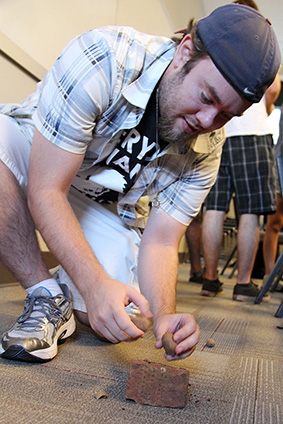Anthropology students use interactive activities to learn about primate behavior
The problem with eating crickets is getting their legs stuck in your teeth.
Karl Bennett, a senior majoring in anthropology, ate crickets with his classmates in ANT 312 Non-Human Primates, an introductory primatology course.

“They tasted like sunflower seeds with shells,” Bennett said. “The weirdest thing with the crickets was feeling the legs on my tongue and picking them out from my teeth.”
Jordan Cooper, a senior majoring in French, brought the crickets to demonstrate part of the primate diet.
“I bought them at Spencer’s, but you can bake them as well,” Cooper said. “You have to bake them live though, and I didn’t want crickets jumping around in my oven.”
Dr. Christopher Lynn, who teaches ANT 312, said he put the responsibility of designing activities on the students to see what sort of things they would come up with.
“We do food demonstrations because they’re a great way to remember specialization and contrast human adaptations with primates,” Lynn said.
Students brought stones and pecans into the class to show how capuchin monkeys break open nutshells. Another group used cookies and lemon juice to simulate protective and territorial behavior of pygmy slow lorises.
“We used lemon juice to replicate the sweat glands of pygmy slow lorises, because they have this stuff they secrete onto their babies so that predators won’t eat them,” Bennett said. “They also mark their territory with their own urine.”
The group marked some cookies with lemon juice and left others unmarked. The point was for everyone to be able to smell the acidic lemon juice on certain cookies and not eat them.
Another simulation involved eating bamboo.
“We also ate bamboo and the boys in the class had to fight for it,” Cooper said. “Bamboo was cooked in soy sauce because it is poisonous to humans while raw.”
Lynn said he aims for students to understand their context as primates.
“It also helps us compare humans versus animals and how we can deal with things and they can’t,” said Lesley Smits, a junior majoring in telecommunication and film. “We learn about how equivalent things affect us versus them and the activities really help us remember all the different primates.”
Nathaniel Graham, a senior majoring in anthropology, said the presentations helped him gain valuable experience in designing activities with little top-down direction.
“The interactive presentations are helpful especially if we go on to grad school, because we’re gaining experience on how to lead presentations and activities on anthropology,” Graham said.
Lynn said students have acted out events such as hierarchy overthrows, and each semester the class visits the Birmingham Zoo to conduct behavioral observations of human primates and primates at the zoo in the same ways as field primatologists. The anthropology department also runs an outreach program at Tuscaloosa Magnet Elementary School that includes primate food classes for elementary students.
“It’s great for the students to learn how and why humans can and can’t behave in exactly the same way as some of their nearest living relatives,” Lynn said.